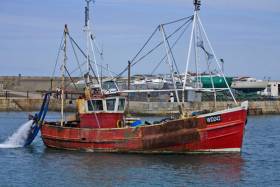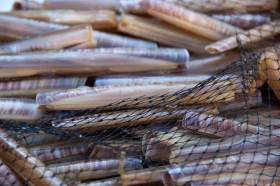Displaying items by tag: National Inshore Fisheries Forum
#Fishing - Marine Minister Michael Creed TD has launched a public consultation on the Inshore Fisheries Strategy, following a proposal made by the National Inshore Fisheries Forum.
The consultation process will be open for a seven-week period and is due to close on Friday 17 August.
The proposed strategy will frame the work of the Inshore Forums over the next number of years. It follows an extensive consultation process involving the National and Regional Inshore Fisheries Forums on initiatives that seek to cultivate a more sustainable, profitable and well-managed inshore fisheries sector.
This is the first time in the history of the State that inshore fishermen have set about developing a sector-specific strategy for themselves, the minister’s department added.
“I welcome the crucial role that the Inshore Fisheries Forums have played in its development and I am pleased that the Forum members are continuing to take the lead when it comes to engaging with issues that affect the inshore sector. I would like to thank BIM for facilitating the Forums in undertaking this task,” Minister Creed said.
The development of an inshore strategy will underpin a sustainable inshore fisheries sector and afford an opportunity to target funding support available under the European Maritime and Fisheries Fund to where it can be most effectively used.
“This is an opportunity for all interested parties to contribute their views on the development of the first strategic plan for the inshore sector,” the minister said. “It is critical that stakeholders have their views considered as this strategy will frame the work of the Inshore Forums over the next number of years and provide a clear direction for the development of the inshore sector.”
Interested parties are invited to view and complete the consultation available online.
Meanwhile, the European Commission has begun an investigation into the State’s monitoring of supertrawlers in Irish waters, according to The Irish Times.
Inconsistencies in Ireland’s mackerel fishery out of Killybegs prompted new controls by the Sea-Fisheries Protection Authority, which are currently under audit by the EU directorate-general for maritime affairs and fisheries.
Ireland’s mackerel quota, the second largest in the EU, was reduced for 2018 to just under 70,000 tonnes in last October’s international fisheries negotiations, as previously reported on Afloat.ie.
The Irish Times has more on the story HERE.
Concerns Over Supertrawlers In Inshore Waters Discussed At National Fisheries Forum
#Fishing - Marine Minister Michael Creed hosted the 13th meeting of the National Inshore Fisheries Forum (NIFF) yesterday, Thursday 22 February.
The Inshore Fisheries Forum structures, which include NIFF and six Regional Inshore Fisheries Forums (RIFFs), were established in 2014 to foster stakeholder-led development of proposals for the inshore fishing sector.
Minister Creed announced that he expects to publish a consultation paper to review the options for more restricted access for large fishing vessels fishing by means of trawls inside Ireland’s six-nautical-mile zone.
This issue has been the subject of scientific and economic reports by the Marine Institute and Bord Iascaigh Mhara (BIM) and some preliminary engagement with fisheries representative groups, including the NIFF.
“I recognise that this issue has been raised by the National Inshore Fisheries Forum since its inception and that there are concerns about the relatively open access for large trawlers to our inshore areas,” said the minister. “The inshore fisheries sector, including coastal and island fisherman, is dependent on inshore fish stocks.
“I am open to looking at the benefits, from an economic perspective for the inshore fleet of introducing some restrictions on large vessels. This could also have a positive biological impact on fish stocks and biodiversity.
“I am awaiting a paper from the department setting out the issues, possible benefits and options to inform my consideration of the issues and possible impacts, both positive and negative. I am planning to undertake a public consultation on the options and to hear and understand the diverse interests of stakeholders to ensure that any new measures introduced are fair and balanced.”
Minister Creed and the NIFF also discussed feedback on recent public consultations on conservation measures for brown crab and razor clams.
The consultations were held following recommendations from the NIFF and the measures are under consideration for their potential benefits to protect fish stocks in the long term. The minister also discussed the impact of Brexit on the fishing sector.
In addition, the NIFF updated the minister on its progress in preparing a sector-specific strategy for the first time.
Supported by BIM and a steering group including the Department of Agriculture, Food and the Marine; the Marine Institute; and the SFPA, consultants are facilitating the preparation of an Inshore Fisheries Strategy on behalf of the NIFF.
Steps taken to date include preliminary consultation, a workshop with the Regional Inshore Fisheries Forums and feedback sessions with the Steering Group.
Minister Creed welcomed the news that the next expected output is a draft strategy document for public consultation.
Public Consultations Conservation Proposals For Razor Clams In North Irish Sea & Brown Crab
#Fishing - Marine Minister Michael Creed has announced that following proposals made by the National Inshore Fisheries Forum, two public consultations will be held on conservation measures for razor clams in the North Irish Sea and brown crab in Irish waters.
Regarding razor clams, it is proposed to increase the minimum conservation reference size for razor clams in the North Irish Sea.
The change, if implemented would require that only razor clams with a minimum size of 125mm could be landed. Currently any razor clams over 100mm may be landed. This proposal was put forward by the North Irish Sea Razor Fishermen’s Association through the North East Regional Inshore Fisheries Forum.
Regarding brown crab, the proposal is to increase the minimum conservation reference size from 130mm to 140mm for brown crab that may be landed. This proposal was put forward by the members of the fishing industry through the South East Regional Inshore Fisheries Forum.
Interested parties and stakeholders are invited to view and complete the consultations available on the FishingNET website HERE. Submissions may be made via post, e-mail or online through the web portal.































































